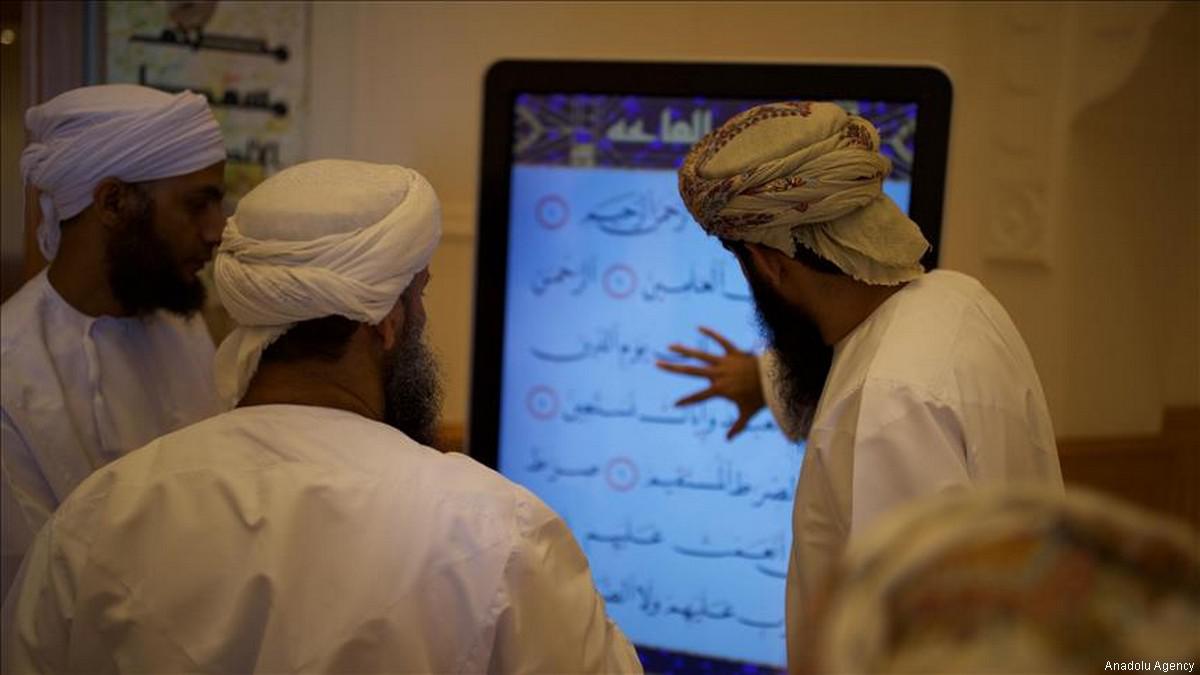The Sultanate of Oman this week unveiled the world’s first interactive calligraphic electronic Quran – developed by experts from Germany, Holland, Poland and Lebanon.
The Electronic Mushaf Muscat Calligraphy Project was developed by specialists from Germany, the Netherlands, Poland and Lebanon and is available for desktops, laptops, tablets and mobile phones.
It works on all operating systems, including Windows, Mac, Linux, iOS and Android.
No applications are needed, but a web browser that allows users to reach the site can be found at https://mushafmuscat.om/
The website allows users to add swashes, coloring or rotating diacritics, switch between different heading styles, and select alternative ligatures.
An interface enables users to tweak the typographic features used for the naskh text, a design based on the analysis of five centuries of Ottoman manual text production, while the project’s most striking aspect is its word-shaping feature.
Construction of the web-based Quran started in 2013, when Scalable Vector Graphics, a lightweight image format for new computer typography, gained general acceptance.
Chapter headings are written in the 8th-century Kufic style, based on 148 colored photographs taken in 1984 by Gerd-Rüdiger Puin, a German scholar on Quranic historical orthography (the study and interpretation of ancient manuscripts).
Puin catalogued some 30,000 Quran fragments discovered in 1965 following an earthquake in Yemeni capital Sanaa.
He sent his 148 color slides to Thomas Milo, a Dutch linguist specialized in Arabic script. Milo is a partner at DecoType, an outfit that has worked on Arabic script technology since 1982.
DecoType developed the computer typography for the first truly virtual Quran, available as a web-interface.
“The problem how to maintain textual integrity on the worldwide web was solved by upgrading DecoType’s Advanced Composition Engine to handle Arabic script in its full width and depth and by reinventing computer typography – this time without fonts – to stabilize the graphic result on all devices,” Milo explained.
This is why, for three years, Stanislaw Jesmanowicz, a Polish mathematician specialized in computer analysis, worked to create the website and user-interface that links the DecoType computer typography to the displays of multiple types of electronic devices.
Peter Somers, an aircraft engineer and professor at Delft Technical University in the Netherlands, wrote the font layout engine that drives the word-shaper, as well as the page layout.
The book layout, made by Lara Captan, can be viewed at http://www.laracaptan.com.
The Electronic Mushaf Muscat Project is based on Unicode, the industry standard for global text interchange.
“Without compromising the text in any way, the Quran is now beautifully represented in digital form, using Unicode characters,” Mark E. Davis, president of the Unicode Consortium, which provides characters for world languages on electronic devices, said.
The government of Oman is one of a small number of governments that are members of the Unicode Consortium. Most consortium members are major technology companies, such as Adobe, Apple, Facebook, Google, Huawei, IBM, Microsoft, Netflix, Oracle and SAP.
Oman’s minister of endowments and religious affairs, Sheikh Abdallah bin Mohammad bin Abdullah as-Salimi, has supported and financed the project’s development.
Oman hopes to become a world leader in electronic calligraphic Quran production. The minister, for his part, hopes to reconcile Islamic civilization and state-of-the-art technology.
“Our Quran is dedicated to all the world’s Muslims in hopes that they might enjoy a new experience of calligraphy online, wherever they are or wherever they go,” as-Salimi said.
[Source: Middle East Monitor]





 WhatsApp us
WhatsApp us 


1 comment
it is an outstanding Work! Never seen anywhere in the digital Society
Jezak Allah Khiren for Oman Government